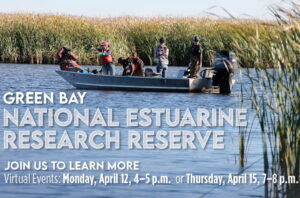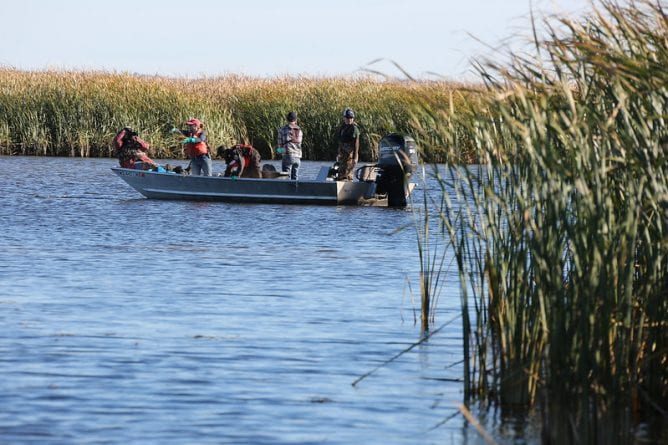Public kick-off event is April 12 (and again April 15)
Green Bay, Wis.—The University of Wisconsin-Green Bay, in partnership with local and national agencies, is leading efforts to recognize local waters as a national reserve—an important next step in the region’s 30-plus-year effort to protect one of the largest surface freshwater systems on earth.
Upon site selection within the Green Bay estuary, the NERR designation (National Estuarine Research Reserve) will use locally relevant and nationally significant research to address local coastal management issues and help protect the world’s largest freshwater estuary.
 The University, along with local officials and representatives of NOAA (National Oceanic and Atmospheric Administration), invite interested organizations and members of the public, to join with them to learn more about the NERR designation and what it will mean to the region. A virtual event will be held April 12, 2021 at 4 p.m. and it will be repeated April 15 at 7 p.m. U.S. Senator Tammy Baldwin and U.S. Congressman Mike Gallagher will take part in the event. There will be a live question and answer opportunity at each event. Each event will have live captioning.
The University, along with local officials and representatives of NOAA (National Oceanic and Atmospheric Administration), invite interested organizations and members of the public, to join with them to learn more about the NERR designation and what it will mean to the region. A virtual event will be held April 12, 2021 at 4 p.m. and it will be repeated April 15 at 7 p.m. U.S. Senator Tammy Baldwin and U.S. Congressman Mike Gallagher will take part in the event. There will be a live question and answer opportunity at each event. Each event will have live captioning.
Registration for the event and more information is available at this website or https://www.uwgb.edu/national-estuarine-research-reserves/.
The importance of Great Lakes estuaries cannot be overstated. These are semi-enclosed areas where the Great Lakes waters mix with waters from rivers, streams and bays. Estuaries are distinctly responsible for filtering sediments and pollutants from rivers and streams, providing cleaner water for humans and wildlife. Estuaries have tremendous economic and cultural impact on a region; providing transportation, recreation, commerce and food. The water issues surrounding Northeast Wisconsin in recent years make a project like the NERR even more significant for area waterways.
“Ducks Unlimited (DU) is excited to be part of the partnership to bring a NERR to Green Bay and even more excited to add the resources associated with the Reserve to an already very effective conservation community,” says Brian Glenzinski, regional biologist for Ducks Unlimited. “Green Bay is an incredibly important area for migratory birds and a priority for DU and we have, therefore, established a conservation delivery program with partners in the area. One of the most useful partnerships is with UW-Green Bay, in which we can immediately study and evaluate the conservation practices installed to gain a better understanding of restoration efforts in the Bay and apply findings to future projects. The GB-NERR has great potential to elevate and expand this cycle for benefit of Green Bay, the Great Lakes and beyond.”
The NERR designation will help UW-Green Bay and its partners bring in funding—more than $1 million per year—for water-focused scientific research, education, stewardship and training, and will include a visitor center for hands-on and place-based education, lab space, conference area, and a boat launch.
The goal of the Green Bay National Estuarine Research Reserve is to be the most technologically-advanced NERR in a network of 29 reserves covering more than 1.3 million acres throughout the U.S. The reserve would be non-regulatory, state-owned and managed entity, with program guidance and technical assistance from NOAA.
“In June of 1971, Newsweek was the first national publication to coin UW-Green Bay as Ecology U. For decades, this University has been committed to its ‘Eco U’ roots—studying, preserving and protecting this region that includes the largest freshwater estuary in the world,” said Chancellor Michael Alexander. “The opportunity to bring this type of national attention and support to the region and help solve some of the challenges facing our great waterways is an effort we are proud to lead.”
See more at the UW-Green Bay NERR website. Media calls should be directed to Sue Bodilly, bodillys@uwgb.edu.
Requests for more information about the NERR or the event should be directed to Emily Tyner at tynere@uwgb.edu.
About the University of Wisconsin-Green Bay
Established in 1965, UW-Green Bay is a public institution serving 8,970 undergraduate, graduate and doctoral students and 79,604 continuing education enrollees each year across all campus locations. We educate students from pre-college through retirement and offer 200+ degrees, programs and certificates. UW-Green Bay graduates are resilient, inclusive, sustaining and engaged members of their communities, ready to rise to fearlessly face challenges, solve problems and embrace diverse ideas and people. With four campus locations, the University welcomes students from every corner of the world. In 2020, UW-Green Bay was the fastest growing UW school in Wisconsin. For more information, visit www.uwgb.edu.

